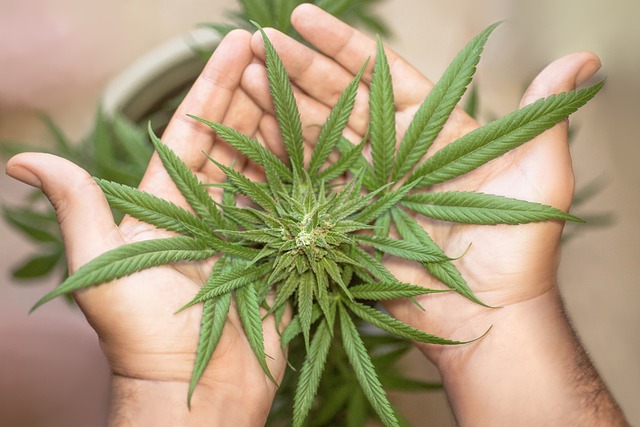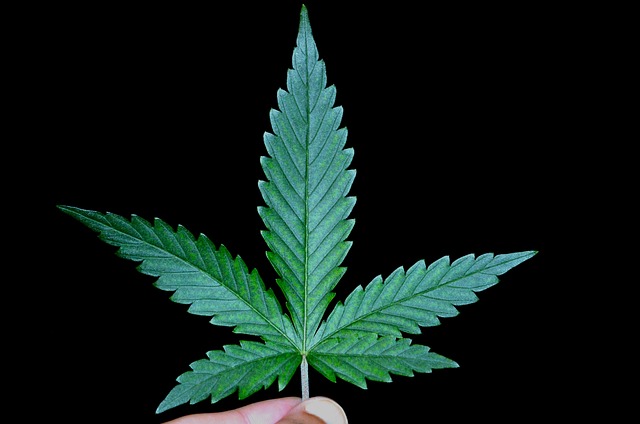In New Mexico, THCA (Tetrahydrocannabinolic Acid), a non-psychoactive cannabinoid found in raw cannabis flowers, is legally recognized for its therapeutic properties, which include anti-inflammatory and neuroprotective effects. Unlike its psychoactive counterpart THC, THCA is legal under the state's medical cannabis program when derived from hemp or containing less than 0.3% delta-9 THC. The state's clear regulatory approach allows for research into THCA's benefits and safeguards consumers. Residents can legally use THCA flowers for health improvements, with a growing interest in its potential to support the endocannabinoid system without inducing a high. New Mexico's progressive stance on THCA reflects its commitment to exploring cannabis' full spectrum of health benefits while navigating the complexities of both state and federal regulations regarding this compound.
Exploring the therapeutic and wellness benefits of cannabinoids, this article delves into the potential of THCA flower, a legal option for residents of New Mexico. We will uncover how this non-psychoactive compound, known scientifically as Tetrahydrocannabinolic acid, can contribute to health and well-being. From understanding its unique benefits and effects to navigating the cultivation and consumption within legal frameworks, readers will gain insight into the science behind THCA and its therapeutic properties. This guide not only illuminates the role of decarboxylation in maximizing its advantages but also provides a comprehensive overview of how to safely engage with THCA flower in compliance with New Mexico’s regulations. Join us as we explore the world of THCA, where legal access and wellness intersect.
- Unveiling the Potential of THCA Flower: A Legal Option in New Mexico
- The Science Behind THCA: Understanding Its Benefits and Effects
- THCA Flower for Wellness: Exploring Its Therapeutic Properties
- The Role of Decarboxylation in Maximizing THCA Flower's Benefits
- Cultivating and Consuming THCA Flower Legally in New Mexico: A Guide to Compliance and Best Practices
Unveiling the Potential of THCA Flower: A Legal Option in New Mexico

In recent years, the conversation around cannabis and its derivatives has evolved significantly, particularly with the emergence of tetrahydrocannabinolic acid (THCA) as a subject of interest. New Mexico has carved out a unique position in this discourse, with state laws making THCA a legal compound for medical use. The THCA flower, rich in cannabidiol (CBD) and devoid of the psychoactive effects typically associated with its counterpart THC, offers a legal avenue for residents seeking the potential therapeutic benefits of cannabis without the high. This legal distinction has opened up a new realm of possibilities for those looking to harness the wellness properties of cannabinoids, as THCA is believed to possess anti-inflammatory and neuroprotective effects that could be beneficial for various health conditions. The state’s regulatory framework not only provides clarity for consumers but also paves the way for research into the potential benefits of THCA, which may extend beyond its medical applications into broader wellness practices. Residents in New Mexico can legally explore these benefits by utilizing THCA flowers in compliance with local laws, thereby engaging with a burgeoning industry that holds promise for both health and economic growth. As such, the legal status of THCA flower in New Mexico stands as a testament to the state’s progressive stance on cannabinoid research and wellness.
The Science Behind THCA: Understanding Its Benefits and Effects

Delta-9 tetrahydrocannabinol (THC) is well-known for its psychoactive effects, but before it reaches this form through heat during combustion or extraction processes, cannabis flowers contain a more abundant and non-psychoactive precursor known as tetrahydrocannabinolic acid A (THCA). THCA is found naturally in raw cannabis plants and has garnered attention for its potential therapeutic properties. Scientific research suggests that THCA may offer a range of benefits, including anti-inflammatory, anti-nausea, and neuroprotective effects, without the psychoactive high associated with THC. Studies have indicated that THCA interacts with the body’s endocannabinoid system by binding to both CB1 and CB2 receptors, which may influence various bodily functions including mood, pain sensation, and immune response.
In the context of legality, THCA itself is considered legal in New Mexico under the state’s medical cannabis program, provided it is derived from hemp or contains less than 0.3% delta-9 THC. This distinction is crucial for consumers and researchers interested in exploring the potential health benefits of THCA without the legal complexities that come with THC products. As such, New Mexico has opened a door for scientific inquiry and personal exploration into the therapeutic effects of THCA, contributing to a growing body of knowledge on this cannabinoid’s properties and potential advantages over its psychoactive counterpart.
THCA Flower for Wellness: Exploring Its Therapeutic Properties

New Mexico has carved out a progressive stance in the realm of cannabis wellness, with THCA (Tetrahydrocannabinolic Acid) flower being legally recognized for its therapeutic properties. Unlike its psychoactive counterpart THC, THCA is non-psychoactive, offering benefits without the intoxicating effects. This allows users to harness its potential wellness advantages without impairment. The flower is celebrated for its anti-inflammatory and neuroprotective qualities, making it a popular choice among those seeking natural relief from various conditions. Research suggests that THCA may support the body’s endocannabinoid system, influencing functions ranging from pain management to mood regulation. In New Mexico, where the legal landscape is favorable, individuals are exploring the myriad of benefits associated with incorporating THCA flower into their wellness routines, often as a complementary approach alongside conventional treatments. The therapeutic properties of THCA flower, particularly its potential in reducing inflammation and easing symptoms related to chronic pain and stress-related disorders, have garnered attention within the wellness community in New Mexico. As interest and research continue to grow, so does the understanding of how this cannabinoid can be a valuable addition to holistic health strategies.
The Role of Decarboxylation in Maximizing THCA Flower's Benefits

delta-9-tetrahydrocannabinolic acid (THCA) is the non-psychoactive precursor to the well-known compound delta-9-tetrahydrocannabinol (THC). Found abundantly in raw cannabis flowers, THCA is gaining recognition for its potential therapeutic properties, which include anti-inflammatory, analgesic, and neuroprotective effects. To fully harness these benefits, understanding the role of decarboxylation is crucial. Decarboxylation is a chemical reaction that converts THCA into THC by removing a carboxyl group. This transformation occurs when cannabis flowers are exposed to heat, such as during smoking, vaporizing, or baking in an oven. In New Mexico, where THCA-rich hemp products are legal under state law, this process is pivotal for those seeking the psychoactive effects of THC, which are not present in raw cannabis due to the absence of decarboxylation. However, for individuals looking to utilize the therapeutic properties of THCA without its psychoactive counterpart, it’s important to maintain the integrity of the THCA molecule through careful handling and storage. This approach allows users to benefit from THCA’s potential advantages directly, which could include a broader range of effects due to THCA’s distinct pharmacological profile compared to THC. Therefore, whether one is looking for the entourage effects that come with activated cannabinoids or preferring the non-psychoactive benefits of THCA, understanding and controlling the decarboxylation process is key to maximizing the full spectrum of therapeutic potential from THCA flowers, especially within the regulatory framework established in New Mexico.
Cultivating and Consuming THCA Flower Legally in New Mexico: A Guide to Compliance and Best Practices

In New Mexico, the cultivation and consumption of THCA flower, a non-psychoactive form of cannabis that contains the raw acidic form of THC, have been regulated under state law. It’s crucial for individuals interested in legally engaging with THCA flowers to stay informed about the evolving regulations. As of recent updates, New Mexico has established clear guidelines for those who wish to cultivate THCA flowers. These guidelines include obtaining a license from the New Mexico Regulation and Licensing Department and adhering to stringent cultivation practices that ensure product safety and quality. Growers must also comply with location restrictions, plant limits, and testing mandates to ensure the THCA flowers are free of contaminants and within legal THC concentration levels.
For those looking to consume THCA flowers legally in New Mexico, it’s equally important to understand and follow the state’s laws. Patients participating in the state’s medical cannabis program may use THCA flowers as part of their treatment, provided they possess a valid recommendation or certificate from a qualified healthcare provider. Consumers must purchase THCA flowers from licensed dispensaries and adhere to personal possession limits set forth by law. It’s also essential to be aware that while New Mexico has legalized medical cannabis, federal laws still classify cannabis as a Schedule I substance, which could impact interstate travel and compliance with other federal regulations. Therefore, individuals must navigate these legal landscapes carefully to ensure full compliance with both state and federal laws when cultivating or consuming THCA flowers in New Mexico.
In conclusion, the exploration into THCA flower’s potential benefits has revealed a promising avenue for wellness within the realm of legal cannabinoids in New Mexico. The science underscores the unique properties of THCA, offering insights into its therapeutic effects and distinguishing it from other cannabinoids. For those interested in incorporating THCA into their wellness routine, understanding the process of decarboxylation is key to maximizing its benefits. This article has provided a comprehensive guide to using THCA flower legally and responsibly in New Mexico, ensuring that readers are well-informed about compliance and best practices. As research continues to evolve, the role of THCA as a legal cannabinoid option is likely to expand, offering new possibilities for natural health support.
